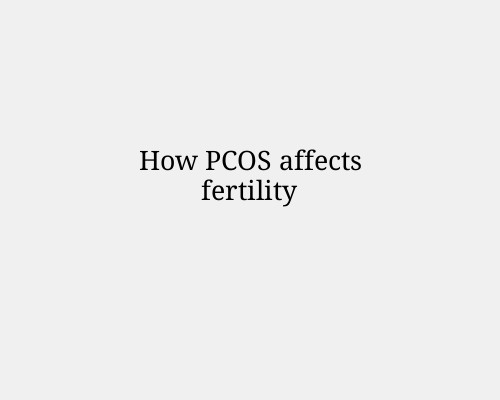
Polycystic ovary syndrome (PCOS) is one of the leading causes of infertility in women of reproductive age. It is a hormonal disorder that affects ovarian function, leading to irregular ovulation or anovulation (lack of ovulation), which significantly impacts conception.
Irregular ovulation or anovulation
Women with PCOS often experience irregular menstrual cycles due to hormonal imbalances, particularly elevated levels of androgens (male hormones) and insulin resistance. Without regular ovulation, conception becomes difficult or impossible.
Hormonal imbalances
PCOS is characterized by an imbalance of reproductive hormones, including higher-than-normal levels of luteinizing hormone (LH) and insulin. These imbalances can prevent follicles from maturing properly, hindering the release of eggs needed for fertilization.
Insulin resistance and weight gain
Many women with PCOS experience insulin resistance, which contributes to weight gain and metabolic issues. Excess weight can further disrupt ovulation and lower fertility by increasing oestrogen production from fat cells, creating a cycle of hormonal imbalance.
Poor egg quality
Although women with PCOS often have multiple small follicles in their ovaries, these follicles do not always develop into mature eggs. This can lead to lower-quality eggs, which reduces the chances of successful fertilization and implantation.
Increased risk of miscarriage
Women with PCOS have a higher risk of miscarriage, which may be due to poor egg quality, insulin resistance, or hormonal imbalances affecting the uterine lining.
Endometrial dysfunction
PCOS can cause irregular shedding of the uterine lining, leading to a build-up that may impair implantation or cause abnormal bleeding.
Improving fertility with PCOS
While PCOS presents challenges, many women with the condition can conceive with the right interventions. Here are some effective strategies:
Lifestyle changes
Weight management: Losing even 5-10% of body weight can improve ovulation and increase fertility.
Dietary adjustments: A low glycemic index (GI) diet rich in whole foods, lean proteins, and healthy fats can help regulate blood sugar and hormones.
Exercise: Regular physical activity improves insulin sensitivity and supports hormonal balance.
Medications for ovulation induction
Clomiphene Citrate (Clomid): Often the first-line medication to stimulate ovulation.
Letrozole (Femara): An alternative to Clomid, often more effective in women with PCOS.
Metformin: Helps manage insulin resistance and may restore ovulation in some cases.
Gonadotropins: Injectable hormones used when oral medications are ineffective.
Assisted reproductive technologies (ART)
Intrauterine insemination (IUI): Helps increase the chances of sperm meeting the egg.
In vitro fertilization (IVF): A more advanced option for women who do not respond to other treatments.
Managing stress and sleep
Chronic stress and poor sleep can further disrupt hormone balance. Practices like yoga, meditation, and maintaining a healthy sleep routine can support fertility.
Conclusion
PCOS is a leading cause of infertility, but it does not mean that conception is impossible. By managing weight, improving diet, using ovulation-inducing medications, and seeking fertility treatments when necessary, many women with PCOS successfully conceive. If you're struggling with infertility due to PCOS, consulting a reproductive endocrinologist can help develop a personalized treatment plan.